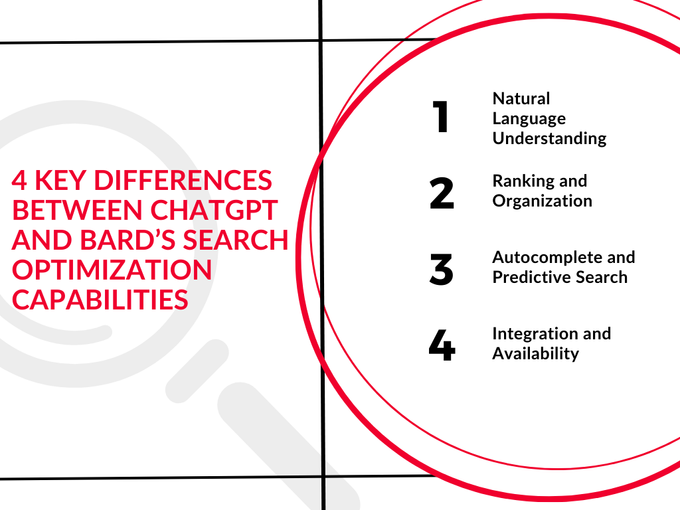Bard vs ChatGPT: Which Is the Future of Search Optimization?
Enhance your onsite search functionality by integrating Bard or ChatGPT APIs into your eCommerce store.
Updated November 19, 2024.

Using ChatGPT or Google Bard can improve your eCommerce search engine’s performance. And with nearly half of your visitors going straight to the search box, delivering relevant results is key.
These advanced tools give developers and businesses the means to improve search relevance, tailor user experiences, and upgrade eCommerce search functionality, often using an application programming interface (API). So, which one offers the best search optimization, and why? Let’s give a brief overview before we get into the details.
| Feature | ChatGPT | Google Bard |
|---|---|---|
| Natural language understanding | Very good | Good |
| Ranking and organization | Very good | Good |
| Autocomplete and predictive search | Good | Very good |
| Integration and availability | Very good | Limited |
Meet the Expert
Jameela Ghann is a seasoned online store owner with over a decade of eCommerce experience. Apart from running Alora Boutique, she's also the marketing manager for Fera Product Reviews.
What is ChatGPT?
ChatGPT is a large language model chatbot developed by OpenAI that utilizes generative AI technology to excel in understanding natural language and user intent.
Its API allows you to integrate its capabilities into your applications to provide personalized search experiences, conversational interactions, and creative text generation.
» Get more info in ChatGPT API documentation
What is Google Bard?
Google Bard is a large language model chatbot developed by Google AI that utilizes search-centric AI technology to excel in understanding natural language and search queries.
Its API allows you to integrate its capabilities into your websites and applications to enhance site search relevance, optimize content for search engines, and generate creative text formats.
Chat GPT vs Bard: A Comparative Analysis for Search Optimization
Search optimization is about making your website as easy to navigate and discover as possible. This involves incorporating intelligent search functionality that can help users find more relevant answers to their queries quickly and efficiently.
You can do this through out-of-the-box AI-led search tools made just for this purpose, or you can take a DIY approach, incorporating the API into your application. Let's compare ChatGPT and Bard to help you make an informed decision.
1. Natural Language Understanding
In eCommerce, customers often interact with the platform through search queries or chatbots, which are driven by AI.
ChatGPT excels in natural language understanding (NLU), enabling it to provide contextually relevant answers to search queries. Its ability to decipher user intent and preferences makes it well-suited for personalized search experiences.
Natural Language Understanding is "the ability of a computer to understand human language. You can use it for many applications, such as chatbots, voice assistants, and automated translation services."
While Bard can also understand natural language, its main purpose is to provide accurate and informative search results, rather than creating personalized experiences. It uses search-focused AI technology to grasp search queries and deliver relevant information.
2. Ranking and Organization
ChatGPT in eCommerce offers valuable assistance in ranking and organizing website content. It can help structure headings, data, and even create regression charts, improving the overall organization and searchability of content.
Bard's capabilities in ranking and organizing content are more limited compared to ChatGPT. While it can provide some assistance in structuring headings, it doesn't extend to creating regression charts or in-depth content organization.
3. Autocomplete and Predictive Search
Bard shines in autocomplete and predictive search features. Its vast training data lets it make accurate predictions and suggestions as users type their queries.
Integrating this into your eCommerce search engine can also enhance the autocomplete and auto-suggestion features. By understanding the context and user intent, Bard can provide more relevant and accurate suggestions, making it easier for customers to find the products they're looking for quickly.
4. Integration and Availability
ChatGPT boasts broader integration across various apps and platforms, making it more accessible for eCommerce and conversational shopping assistance. Its widespread adoption by major retailers like Walmart further strengthens its position.
Bard's availability is more restricted compared to ChatGPT. It's unavailable in several regions, including parts of the European Union and Canada. This restricted availability can be a decisive factor in your choice.
Future of the AI-Powered Search Optimization
The way people search is changing, so you may need to change how you optimize your website. Pay attention to these trends so you can stay ahead of the curve and make sure your customers can find you and find what they are looking for.
- Visual search: Visual search is set to become more prevalent. Users will increasingly rely on images to find products and information. AI-driven systems will enable users to search for items simply by uploading an image or using their device's camera. This trend is particularly significant for eCommerce, as it simplifies finding and purchasing products.
- Voice search: Voice search is another area where we can expect substantial growth. AI-powered voice assistants will not only understand spoken queries but also respond in a more natural and conversational manner. Voice-activated chatbots will become more common, providing users with voice responses and even accompanying visual elements where necessary.
- Video search: As technology advances, chatbots and AI-driven systems will become more proficient at parsing video content. This means they will be able to understand and respond to user queries related to video content. Video search optimization will be essential for platforms that host video content and want to improve user engagement.
- Augmented Reality (AR): While virtual reality (VR) adoption may still be a bit distant, augmented reality (AR) is likely to gain traction. AI models will play a crucial role in AR applications, enhancing the user experience by overlaying digital information in the real world. For eCommerce, this could mean more interactive and immersive shopping experiences.
» Want to engage customers like never before? Discover conversational commerce
ChatGPT and Bard: Two Worthy Contenders for the Future of AI
ChatGPT and Google Bard are at the forefront of AI-powered search optimization. While ChatGPT currently leads in certain areas, Google's Bard is making significant strides.
Programming your search using APIs takes time and expertise so it may be wise to choose a ready-to-use AI-driven solution. These solutions, powered by natural language processing and machine learning, can significantly enhance search functionality.
As the capabilities of Google Bard and ChatGPT expand, their potential to connect customers with relevant products and services will only grow. Businesses that embrace these AI-powered tools are well-positioned to succeed in the ever-evolving digital world.

![A Complete Guide to eCommerce Product Search Engine: Benefits, Features, Tools, & More [{year}]](https://entail.fastsimon.com/en-assets/fastsimon/fit-in/280x280/shutterstock_2258027821-1675770772417.jpg)



